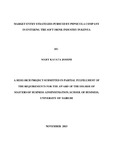| dc.description.abstract | In the current global market, many companies even the well established multinational companies
are finding it hard to expand to foreign markets. A firm's choice of mode of entry into a foreign
market is one of the most important decisions made by international managers. The entry mode
chosen affects the amount of control the firm will have on its business activities abroad.A firm
can set up an entry to a foreign market in only two ways, it export its products to a foreign
market or it can transfer its resources such as technology, capital, know-how, brand name to a
foreign market in which those resources can be sold directly to customers or combined with
resource in the host country to manufacture product for that market. Entering new markets,
despite the huge potential that it provides, does involve big risks. Foreign market entry mode is
an institutional arrangement that makes possible the entry of a firm's products, service, know how,
management and other resources into a foreign market. With Coca-cola company having
the bigger share of the soft drink market across the globe, Pepsi Cola has found it hard to compete
with it. Pepsi Cola recognized that it cannot win against Coke on a head-to-head scenario in all
markets. This study's objectives were to establish the market entry strategies pursued by
Pepsi Cola in Kenya. And to establish the factors that influenced Pepsi Cola to entry Kenyan
market. The study adopted a case study design which was the most appropriate in the
investigation of the strategies pursued by Pepsi Cola to enter the Kenyan market. The study used
primary data collected using an interview guide. The respondents comprised the managers such
as the area sales managers, human resource manager, public relations officer and food service
manager. The data collected was analyzed using content analysis which was used to analyze the
data by grouping it according to the responses obtained. The study concludes that PepsiCola
Company was driven by several motivations to re-enter the Kenyan market. The study also
concludes that prior to setting up the local plant; Pepsi used exporting and franchising strategy
where it offered its products to the market through their licensed franchiser SBC. The study also
concludes that the strategy of exporting, franchising and then setting up a local plant were so
timely and well calculated. The study recommends that the multinationals Corporations (MNCs)
should critically analyze the various strategies at their disposal in entering a new market before
making decisions on how to enter the selected market. The study also recommends that MNCs
should consider the advantages and disadvantages the different strategies before selecting on a
given strategy. They need to assess the options available for their market entry and be able to
select the strategy with more advantages and one that will ensure successful market entry and
acceptability by the local market regulators. The study recommends that further research should
be done on the foreign market entry strategies adopted by Multinational corporations including
other banks in the Kenyan market to allow for generalization of foreign market entry strategies
adopted by MNCs in Kenya since each employs a different market entry strategy | en_US |

